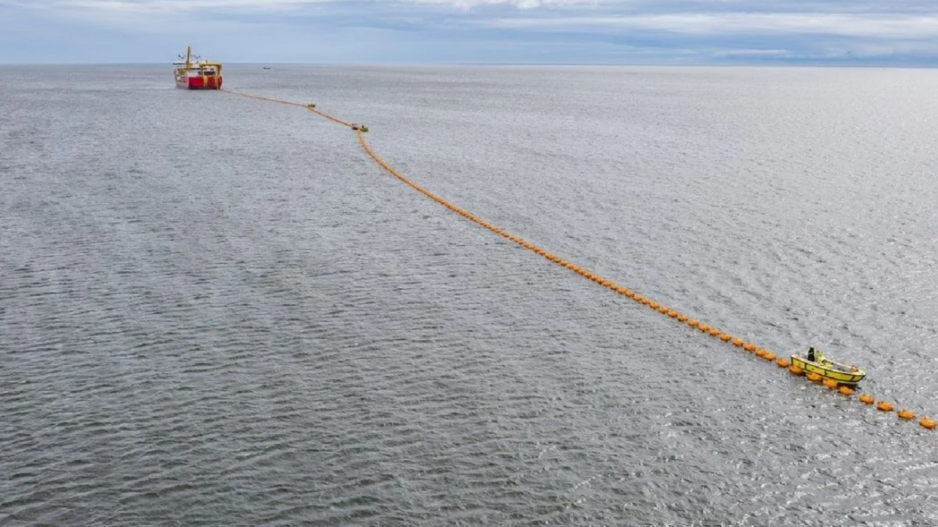The government on Thursday decided to push back its decision to next Tuesday over the regulatory framework of the leg of the Great Sea Interconnector project connecting Cyprus to Crete.
Government spokesman Konstantinos Letymbiotis explained that the government had decided to hold a meeting with all involved parties on Tuesday afternoon, and that its final decision on the matter would only be made after that meeting.
Tuesday’s meeting will be attended by Energy Minister George Papanastasiou, Finance Minister Makis Kervanos, Deputy Minister to the President Irene Piki, Greek Energy Minister Theodoros Skylakakis, a representative from the European Commission and representatives from Greece’s independent power transmission system operator Admie, cable company Nexans, and Cyprus’ legal service.
Letymbiotis described the project’s importance as “indisputable” and added that the government is approaching the matter “with responsibility and due diligence with the sole aim of serving the Cypriot people’s interests”.
The Cyprus News Agency reported that a cabinet meeting will be held after Tuesday’s meeting.
In the evening, speaking to journalists while attending a function, President Nikos Christodoulides said whatever decision is made would “first and foremost serve the interests of the Cypriot people”.
Given the track record of large-scale projects in Cyprus, he added, “we shall do everything possible to ensure not a single doubt lingers over any issue concerning this strategically important project.
“That is why we took the initiative to hold the meeting in Nicosia, with everyone attending, so that we get answers to every last detail.”
The government had initially been expected to make its final decision on the matter on Thursday at a planned extraordinary session of the cabinet, but the cabinet session was called off with Tuesday’s meeting now planned.
Consultations had been ongoing throughout Thursday between Cyprus’ energy ministry, legal service and finance ministry, as well as with the Greek authorities, Admie, and the European Commission, and those consultations have now led to Tuesday’s scheduled meeting.
The main point of contention is Admie’s request for Cyprus to pay a total of €125 million between 2025 and 2029 – before the interconnector is operational, in effect helping finance the project and ensuring that Admie will have a stable income while investing in the project before the project itself turns a profit.
In the end, a solution to the matter had reportedly been reached, with the Cypriot government set to utilise funds made available to it through the European Union’s emissions trading system (ETS) to pay the required €125m.
Admie had reportedly initially driven a hard bargain on the matter but, faced with the spectre of the project’s collapse and the possibility of being liable for tens of millions of euros to cable producer Nexans, which had already been commissioned to start the project, they reportedly eventually backed down.
The €125m payable over five years to Admie is separate from the €100m buy-in to the project’s holding company, which Cyprus is required to pay if it wishes to buy itself into the project.
On that matter, the Cypriot government has demanded access to a cost-benefit analysis and the time to evaluate it before coming to a final decision, but the finance ministry’s permanent secretary George Panteli had said last week that Cyprus’ authorities have not yet seen the project’s financing plan.
In both cases, the matter of “geopolitical risk” is taking increasing precedence, with fears growing regarding the region’s potential geopolitical volatility.
The issue of “geopolitical risk” relates to possible interference with the laying of the cable by Turkish warships in the Aegean. Admie had sought reassurances that should anything occur beyond its control which would hinder the interconnector project, including Turkish interference, it would be able to recover the investments it had made up to that point.
With this in mind, Admie had asked the Cyprus Energy Regulatory Authority (Cera) to “diversify its regulatory framework to cover the geopolitical risk” of the project.
The current regulatory framework provides that the matter of covering costs of the project should it not be completed due to “geopolitical factors” “may” be considered by the regulatory authority, with George Papanastasiou and Cera chairman Andreas Poullikkas both in agreement that the current laws on the matter suffice.
Papanastasiou last week pointed out that Admie had requested six regulatory changes, and that Cera had accepted four of them.
“The two that are left are very important, and we responded in writing to Admie that Cera’s position is clear: consumers cannot shoulder any costs without benefitting,” he said.







Click here to change your cookie preferences